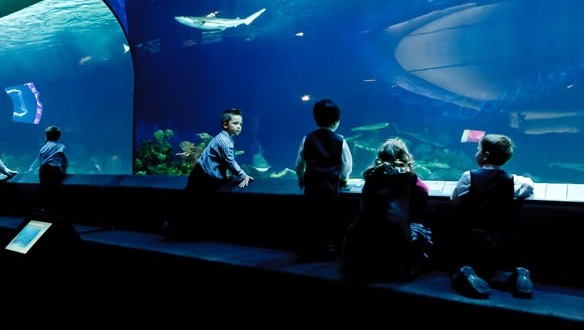A world-renowned animal expert is jumping into a heated debate over whether the Vancouver Aquarium should keep whales and dolphins in captivity.
Dr. Jane Goodall, one of the world’s leading primate experts, has sent a letter to the Vancouver Park Board calling for the popular attraction to phase out its practice of keeping and breeding cetaceans at the Stanley Park facility.
In the letter, Goodall busts open the myth that “science” is in support of the capture and captivity of wild cetaceans. The Vancouver Aquarium not only has perpetuated cruel captive breeding programs, but they also actively lease animals raised on their facility to SeaWorld. How this could be regarded as being in the best interest of any wild animal is a mystery to me.
In the words of Goodall, “The idea that certain cetaceans ‘do better’ in captivity than others is also misleading, as belugas, dolphins and porpoises are highly social animals which can travel in large pods and migrate long distances.”
Having studied the intricate behaviors of animals in their natural habitat, Goodall knows full-well how devastating captivity can be to wild animals and given the growing movement against these cruel programs, the end of Vancouver Aquarium’s captive cetacean program seems a natural progression.
Goodall has received criticism from Clint Wright, the vice president of the Vancouver Aquarium, who asserts he does not believe Goodall has ample information to assess the well-being of the aquarium’s animals. But the fact remains, a captive cetacean is no different then any other captive animal. Once we begin to see all the animals we hold captive as equals with each other and ourselves, a real change will finally come about.
Dr. Jane Goodall’s entire letter to the Vancouver Park Board:
Dear Park Board Chairman and Commissioners,
The capture, breeding and keeping of cetaceans world-wide has come under increasing public scrutiny due to recent high-profile stories being released from industry insiders. The scientific community is also responding to the captivity of these highly social and intelligent species as we now know more than ever, about the complex environments such species require to thrive and achieve good welfare. Those of us who have had the fortunate opportunity to study wild animals in their natural settings where family, community structure and communication form a foundation for these animals’ existence, know the implications of captivity on such species.
I understand the Vancouver Park Board and the Vancouver Aquarium became industry leaders in 1996, when an agreement was made to not allow the keeping of cetaceans caught from the wild after September 16th of that year (with the exception of endangered species or rehabilitation animals that could not be released). However, the current permission of Vancouver Aquarium cetacean breeding programs on-site, and at SeaWorld with belugas on loan, is no longer defensible by science. This is demonstrated by the high mortality rates evident in these breeding programs and by the ongoing use of these animals in interactive shows as entertainment.
The idea that certain cetaceans “do better” in captivity than others is also misleading, as belugas, dolphins and porpoises are highly social animals which can travel in large pods and migrate long distances. In captivity, these highly vocal and complex communicators are forced to live in a low-sensory environment, which is unable to fully meet the needs of their physical and emotional worlds.
As society at large and the scientific community now reflect on the keeping of highly cognitive species like primates, elephants, and cetaceans in entertainment and research, I ask the Vancouver Park Board and the Vancouver Aquarium to do the same. The phasing out of such cetacean programs is the natural progression of human-kind’s evolving view of our non-human animal kin. I hope the Vancouver Park Board and the Vancouver Aquarium will be a leader in compassionate conservation on this issue, as you have done before.
Sincerely,
Jane Goodall, Ph.D., DBE
Founder, the Jane Goodall Institute &
UN Messenger of Peace
Response from Clint Wright, GM and Senior VP, Animal Operations with the Vancouver Aquarium
The Vancouver Aquarium has the greatest respect for Jane Goodall but her information may be incomplete. The current science is clear that beluga whales live as long, if not longer, while in human care. Scientific and behavioural evidence shows that cetaceans at the Vancouver Aquarium are content and thriving. We don’t believe Dr. Goodall has ever visited the Vancouver Aquarium and we welcome the opportunity to host her so she may see, first-hand, the exceptional care our cetaceans receive.
She would also see that the Vancouver Aquarium’s interpretative shows enable us to engage the public in better awareness and understanding of the critical issues facing our oceans and the life within them. The experience we gain working with cetaceans in our care is what enables us to rescue stranded animals and assist in research directly applied to saving wild populations.
Vancouver Aquarium is a non-profit conservation organization dedicated to protecting the health of our oceans. In our 58 years as a marine science centre we have always led with research and education. The cetaceans we expertly care for, and the science we have led for nearly six decades, has made us a well-respected leader in our field.
Agencies/Canadajournal
 Canada Journal – News of the World Articles and videos to bring you the biggest Canadian news stories from across the country every day
Canada Journal – News of the World Articles and videos to bring you the biggest Canadian news stories from across the country every day



